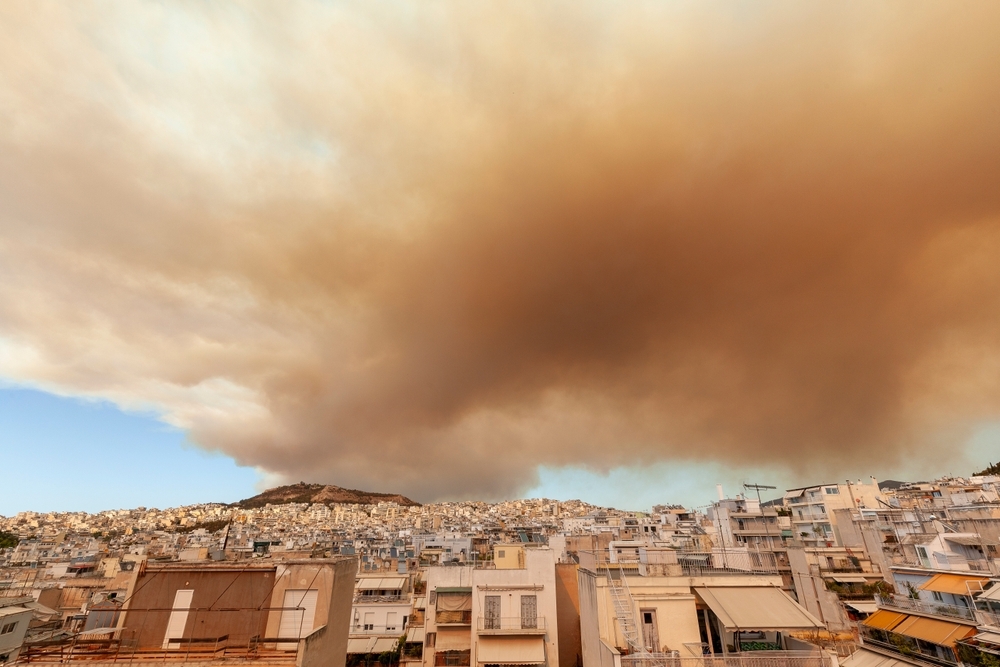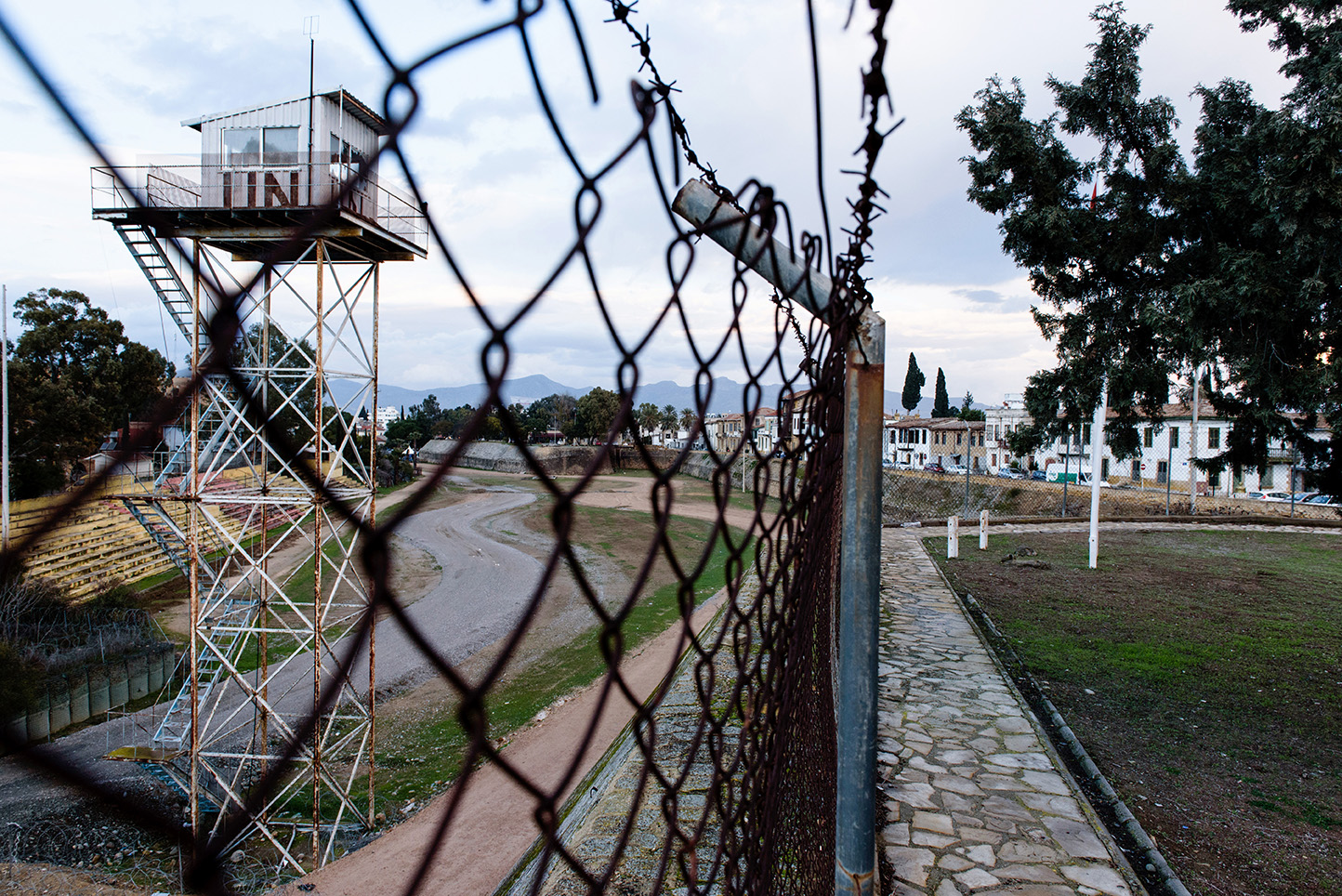Greece, collective trauma in the wake of endless fires
Behind the charred landscapes of Greece’s fiery summers lie untold human stories: of loss, resilience, and deep psychological and social scars for individuals and communities alike. Each year’s wildfires in Greece expose systemic failures

Greece-collective-trauma-in-the-wake-of-endless-fires
Wildfire smoke in the sky above Athens (© yiannisscheidt/Shutterstock)
“If you deconstruct Greece, you will in the end see an olive tree, a grapevine, and a boat remain. That is, with as much, you reconstruct her.” – Odysseas Elytis
Nobel laureate Elytis’ line captures more than poetic imagery; it evokes a deep cultural and historical truth. In Greece, wildfires are not merely environmental disasters; they strike at the very symbols of identity and continuity. Forests, olive groves, and pastures are living archives, carrying the memory of generations, and the olive tree, in particular, has been a central emblem since antiquity.
In myth, it was Athena who gifted the first olive tree to Athens, securing her city’s prosperity and symbolizing wisdom, peace, and resilience. The olive tree’s presence in ancient rituals, daily life, and agriculture links past and present, making its destruction in modern wildfires not just ecological but profoundly cultural. Rebuilding these landscapes thus requires restoring both the land and the enduring threads of heritage and identity that they embody.
When wildfires swept across Greece again this summer, the images were hauntingly familiar: villagers clutching the remnants of their lives, farmers watching their herds perish, residents choking in the smoke of regions under siege. More than 15,700 hectares were consumed in just two weeks, according to European Copernicus data, adding to the staggering 42,000 hectares lost in 2024; a figure far higher than the twenty-year seasonal average.
Personal and collective trauma
For many Greeks, these disasters are not isolated events but part of an unending cycle that has transformed the very fabric of daily life. The trauma is both personal and collective, an invisible scar carried by communities long after the smoke clears. In a country where forests are entwined with local identity and livelihood, the destruction of landscapes feels like the erasure of memory itself.
“The fires that have scarred Greece in recent years caused immeasurable ecological and material losses, but also a deep collective trauma. These collective traumas are not limited to those directly affected; they inscribe themselves in collective memory and alter how society perceives itself and its future,” explains to OBCT Nikos Papadopoulos, sociologist and PhD candidate in psychology at the National and Kapodistrian University of Athens.
His words echo what researchers worldwide have observed: disasters leave behind more than destruction of homes and land; they imprint lasting psychological and social wounds. A study of Australia’s 2009 Black Saturday bushfires found that survivors faced not only post-traumatic stress but a profound sense of rupture in community identity (Eriksen & Gill, 2010). Similarly, research by Gibbs et al. (2013) showed that networks of solidarity were often the only thread holding fire-ravaged communities together.
In the 2018 Mati wildfires in Greece, where neighbors and volunteers provided critical support amid government and emergency service gaps, survivors and victims’ families have remained united in their pursuit of justice. Their efforts culminated in a court verdict in June 2025, where 10 out of 21 defendants were found guilty of negligence leading to the deaths and injuries of over 100 individuals. However, the sentencing sparked outrage as the convicted officials were allowed to pay fines instead of serving prison time, leading to renewed calls for accountability.
Statistics of loss, stories of despair
The numbers tell one story:
– Chios saw nearly 7,000 hectares burned, devastating crops and small businesses.
– Epirus lost more than 2,600 hectares, with thousands of animals – sheep, cows, pigs, poultry – perishing in the flames.
– In Attica, the nation’s largest basin, fires destroyed 8,594 hectares last August alone. Over eight years, the region has lost 26% of its total area and 37% of its forest cover, according to EfSyn.
But the voices of the affected tell another story. The elderly man who burned to death in his mud-brick home in Keratea at 76 is more than a statistic; he embodies a society where the most vulnerable are left behind.
The tragedy is not confined to rural areas. In Patras, Greece’s third-largest city, wildfires reached urban neighborhoods for the first time. Residents watched flames approach just three kilometers from the city center, an unprecedented terror for thousands.
OBCT talked to Marina Gavrilaki, EU Climate Pact Ambassador for Greece and co-founder of the Physisorg start up, which promotes sustainable practices to understand and manage climate change. Gavrilaki points out to the immense ecological toll of such catastrophes, and the inevitable long-term impact on the population’s wellbeing: “Over 55% of burned areas are located within Natura 2000 sites, resulting in extensive biodiversity loss, large-scale destruction of wildlife habitats in regions such as Evros, Rhodes, and Evia. This indicates a consequent decline in air quality, but also, in overall quality of life for Greek citizens.”
Politics, prevention, and neglect
Experts have long warned that Greece’s firefighting model is inadequate. Prevention has been neglected, with poorly maintained electrical networks sparking new blazes year after year. Moreover, public awareness and education around wildfires is limited, as emphasised by Palaiologos Palaiologou, wildfire researcher and analyst, assistant professor of Forest Protection at the Agricultural University of Athens, in a 2024 interview with OBCT.
The European Court of Auditors recently revealed that Greece committed €837 million to fire-related measures, yet absorption of available EU funds remains “extremely low.” The report of the EU spending watchdog talks of insufficient monitoring of how European money is being spent and outdated maps.
Earlier this year, Greek authorities had showcased the upgraded 112 emergency alert system, highlighting the state’s push to enhance public safety and crisis response. The revamped system now includes advanced geolocation, video calling, silent alerts for critical situations, accessibility features for people with disabilities, and offline communication options. Complementing this, a new information platform provides real-time updates on weather conditions, vehicle locations, and aerial firefighting assets, enabling faster coordination among emergency services.
Experts stress that protecting landscapes requires a fundamental shift in policy. In an interview with our partner Der Standard, Johann Goldammer, a fire ecologist consulted by governments worldwide, emphasizes that Greece’s heavy investment in civil protection – 2.5 billion euros this year alone – has proven insufficient. According to Goldammer, “almost all countries focus on firefighting – and that’s the wrong approach. Instead, they should try to reshape their landscapes.”
Greece’s recent announcement to reorganize civil protection and implement reforestation based on the latest scientific knowledge aligns with this perspective, highlighting the urgent need to prioritise preventive landscape management over reactive firefighting. Without such a strategic shift, both cultural heritage and lives remain at risk.
The path forward
Greece’s summers have become a season of dread. But collective trauma, scholars argue, can also seed collective resilience. Communities in Australia and Spain, scarred by fires, have shown how shared grief can mobilize social networks and grassroots activism (Páez et al., 2007).
As Nikos Papadopoulos stresses, healing requires more than rebuilding infrastructure: “Recognition of this loss through memorials that honor both people and the natural environment, strengthening solidarity, and genuine action on prevention are essential. Transparency and responsibility of institutions are necessary to restore trust. Only then can collective trauma transform into resilience instead of remaining an open wound weighing down the future.”
Whether Greece can channel its pain into reform remains uncertain. What is clear is that the fires are no longer just an environmental crisis – they are a national psychological one.
Kostas Zaiferopoulos (EfSyn, Greece) and Kim Son Hoang (Der Standard, Austria) contributed to the production of this article.
This article was produced in the framework of PULSE, a European initiative coordinated by OBCT which promotes cross-border journalistic collaborations.










